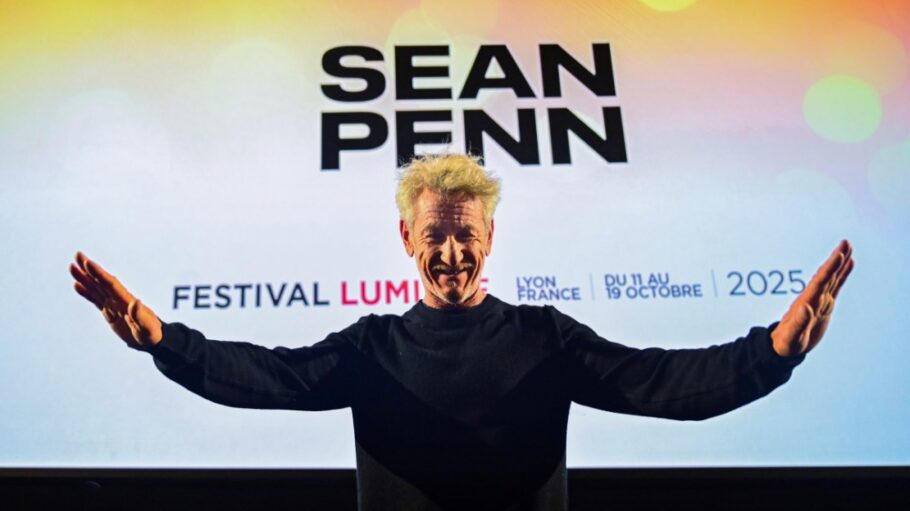Sean Penn may be one of Hollywood’s most intense performers, but at the Lumière Film Festival in Lyon, where he is this year’s guest of honor, he appeared relaxed, funny and disarmingly candid, sharing stories about filmmaking, aging and activism before a packed theater.
At a festival devoted to celebrating both classic and contemporary cinema – and the theatrical experience itself – the two-times Oscar winner began by recalling his first love: the movie theater itself.
“I’ve talked a lot about the experience that I fell in love with, like the girl you fall in love with,” he said. “With cinema, it was in a cinema, with strangers and a big screen. So I’ve had a very difficult time, just as an audience, making the transition into somehow accepting all this streaming and small-screen stuff.”
Known for his total immersion in roles like the death row inmate of “Dead Man Walking” or gay rights activist Harvey Milk in “Milk,” Penn was asked how he prepared to play “a sadistic, fascistic colonel” in Paul Thomas Anderson’s “One Battle After Another.”
“I think you’re being too judgmental,” he deadpanned, drawing laughter from the crowd.
With a smile, he described reading Anderson’s screenplay for the first time. “That’s an example of a great script,” he said. “I was giggling for the first 20 pages, thinking, ‘This is what Paul is doing right now.’ It made me so happy. It’s like knowing the song he’s playing even though you’ve never heard it before. I’m sure that most of what I was dancing to – for better or worse – was just this music that Paul had written.
“The other thing is that one gets older, I notice,” he said with self-deprecating humor, referring to a montage of his films screened at the start of the masterclass. “ Watching this clip reel reminds me of a commencement speech that was given at a university once,” he said. “And whoever was giving the keynote was giving advice to young people. I watch this and I think: Use sunscreen! You see the change and you think, ‘Oh my God, what happened?’”
Love Film & TV?
Get your daily dose of everything happening in music, film and TV in Australia and abroad.
As the discussion turned to the directors who shaped him, Penn recalled the challenges of performing in Brian De Palma’s long, carefully choreographed takes.
“The challenge was, when you have a lot of people in the scene and it’s a long, long shot – which De Palma does a lot of – it’s hard not to be aware that if you fuck up, everything’s got to be perfect, [so] you’ve got to do it again,” he said. “You have to fight being cautious.”
Watching performances in Jack Thorne and Stephen Graham’s “Adolescence” left him humbled, he added. “[It’s] an incredible thing, all those great actors, and each show [was made] in one take!,” he exclaimed. “I now feel I should be an accountant,” he smiled.
Penn also reflected on his collaborations with Terrence Malick with fondness:
“Terry is one of the three or four most instrumental filmmakers in my becoming interested in directing,” he said. “I once told him, ‘If you make a movie again, give me a dollar and GPS coordinates and I’ll be there.’”
Working with Malick, he said, could be as frustrating as it was transcendent.
“He’s a film poet, but more importantly, he’s a poet,” Penn said. “I tried to quit both of the movies I did with him because I felt like paint on his palette – I didn’t know what movie we were making! That’s what makes him so special: you have to trust that he thinks you’ll be of value.”
Then, with affection, he added: “The screenplay of “The Tree of Life” is one of the great poems in the English language. It never does screen directions; it just flows as prose. It’s really extraordinary.”
Midway through the discussion, as moderator Didier Allouch was momentarily distracted by a stage whisper, Penn leaned into the mic: “Can I have a vodka and tonic?” causing a ripple of laughter through the room.
When talk turned to his activism, including his documentary “Superpower,” co-directed with Aaron Kaufman, about his encounters with Ukrainian President Volodymyr Zelensky, Penn reflected on how his activism, filmmaking and carpentry all come from the same impulse.
“I don’t know that I differentiate between getting up in the morning and going to my workshop and building a piece of furniture from going to a movie set and acting or directing a movie, or anything I’ve done working in the NGO space or with the documentary ‘Superpower,’” he said. “It all feels like you’re always looking to be value added. Sometimes you’re not; sometimes you can catch yourself inflaming a situation. You have to weigh risk-benefit on everything – to the situation, not to oneself.”
As for what comes next, Penn only offered a tantalizing hint earlier in the festival, telling Lumière director Thierry Frémaux that he’s at work on “a patriotism story, which I find to be very interesting today.”
The Lumière Film Festival runs in and around Lyon until Oct. 19.
From Variety US































